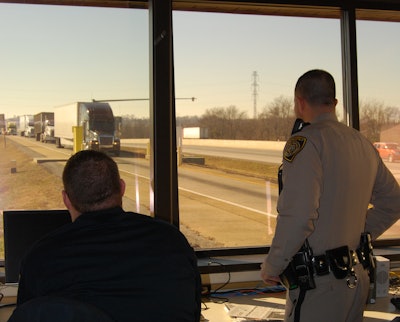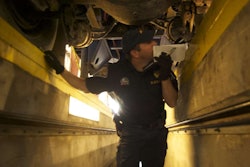 CSA UPDATE: CCJ’s ongoing CSA’s Data Trail series of reports examining news and data related to the CSA program and various enforcement issues reports in its upcoming installment on some of the same issues the ATRI report analyzes. Stay tuned for the report, and in the meantime access updated state data on inspection intensity, violation priorities and more via the maps and downloads available via CCJdigital.com/csa.
CSA UPDATE: CCJ’s ongoing CSA’s Data Trail series of reports examining news and data related to the CSA program and various enforcement issues reports in its upcoming installment on some of the same issues the ATRI report analyzes. Stay tuned for the report, and in the meantime access updated state data on inspection intensity, violation priorities and more via the maps and downloads available via CCJdigital.com/csa.The American Transportation Research Institute (ATRI) July 31 released a study evaluating just how the enforcement disparities that exist around the nation affect carrier safety performance, a key concern for many in the industry — from drivers to carrier safety personnel.
According to ATRI Research Advisory Committee Chairman Steve Niswander, also a vice president with Groendyke Transportation, “This assessment was ranked as the number one research issue for the industry during our annual RAC meeting in 2013, and its impact on the industry should be significant.”
The report stresses that the “different priorities and violation issuance rates across states dramatically undermine the uniformity of CSA [Compliance, Safety, Accountability] — a supposedly standardized safety assessment program,” ATRI said in a press release.
Analyzing carrier Behavioral Analysis and Safety Improvement Category (BASIC) scores in light of different states’ violation rates, study authors attempt to illustrate the variance in scores that would result if a carrier had a different regional operating pattern or if scores were normalized relative to states’ violation rates.
For example, ATRI’s model calculated one carrier’s Hours of Service BASIC percentile decreasing by 4.2 points, but their Vehicle Maintenance percentile increasing by 12.2 points, if state violation rates were normalized.
While ATRI’s study documents the necessity for some flexibility in developing enforcement strategies specific to a state’s needs, it also confirms that state enforcement disparities create uneven safety playing fields, the organization says. Also, based on two nationally recognized violation lists most closely associated with future crash risk, ATRI’s research documents the variability in state emphasis on those violations that generate the greatest safety benefit.
The 100-page document likewise includes close case studies of enforcement practices and outcomes in California, Indiana, Massachusetts, Minnesota, Texas and Washington, and seven carriers of varying size, whose safety performance is analyzed according to geographic area. Most carriers analyzed were in the 1,000-2,000-power-unit range, with just one under 100 power units.
“ATRI’s study unequivocally quantifies what we know is a serious defect in the CSA scoring system – that carrier safety performance as represented by BASIC scores can be dramatically impacted by the states in which a carrier operates based on nothing more than the states’ varying enforcement priorities,” said Brett Sant, Knight Transportation safety vice president and also a member of ATRI’s Research Advisory Committee. “Until these disparities are rectified, peer-based comparisons within CSA’s scoring system will continue to be flawed and of little value as a tool for monitoring carrier and driver safety performance unless accounted for properly.”
You can request an emailed copy of ATRI’s report via this link.
Access CCJ‘s own newly updated CSA’s Data Trail state-by-state inspection/violation data for the most recent calendar year via CCJdigital.com/csa.










